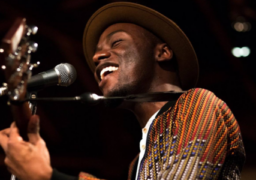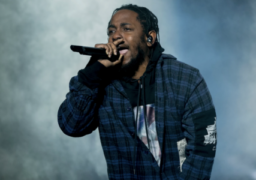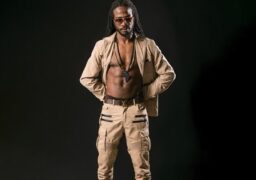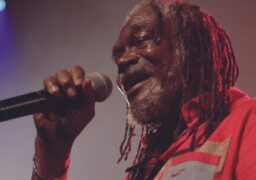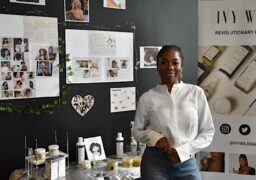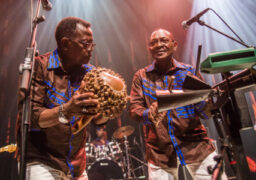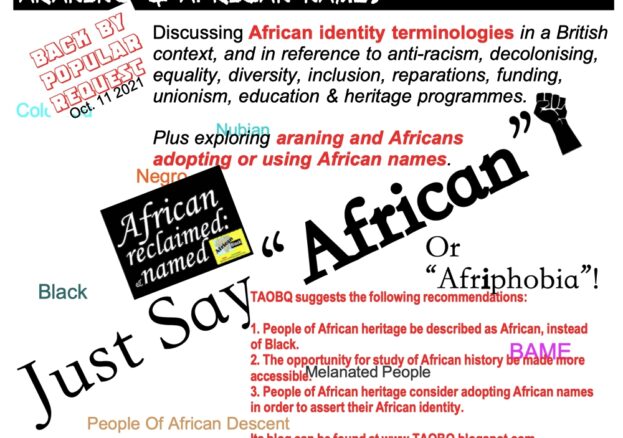
Discussing African identity terminologies in reference to anti-racism, decolonising, reparations; & Africans adopting or using African names
Update: Due to popular demand we’re offering the fourth iteration of this programme on Identity, which has been re-tooled, following the various discussions on BAME and other racial terminologies, plus the last hour will be given to Should Africans Have African Names?, which explores the issue of araning, and the option for people of African heritage to adopt or use African names within the context of reparations and decolonising activism.
So whether you attended or missed the previous events, here’s another chance to engage with an event that not only posited a number of points on language and terminologies, but more importantly, it also had a profound impact on some attendees in terms of the confidence to use certain terminologies to either address their identity or proffer within their work.
“We are the only group in the world who deny ourselves, preferring to be known as “Negroes” rather than Africans. In order to know ourselves we must learn about African history and culture. This is one of the most important steps towards creating unity among Africans at home and abroad.” Walter Rodney
Kwaku will lead this discussion on identity politics and language, using the backdrop from the first pan-African conference, through to the founding of the UNIA-ACL, its first international convention from which the seeds for African History Reflection Day (AHRD) were sown, to today’s Black Lives Matter movement, to underscore his points.
The audience will have a chance to respond and also feedback, using a poll to test strength of feeling about certain points.
Moderated by community and political activist Nana Asante. In the last hour, Kwaku will introduce the Araning concept, and community and environmental activist Awula Serwah will open the Should Africans Have African Names? section – click here to read one of her articles on African names.
Book on this page or via: https://AfricanHistoryPlus.eventbrite.com
Here’s some food for thought to get you thinking on the issues, and the importance of language and terminologies when dealing with either identity politics or history:
African, Black, or People Of Colour?
African Origin, African Heritage, or African Descent?
Afro-Caribbean, African-Caribbean, or Caribbean?
African Caribbean, African or African/African/Caribbean?
African British or British African?
Black History, Africana Studies or African History?
BAME (Black, Asian, Minority Ethnic) or AAME (African, Asian, Minority Ethnic)?
Racism, Afriphobia, or Anti-Black Racism?
Caribbean or West Indian?
Black History Month or African History Month?
Slave or Enslaved?
Slavery or Chattel Enslavement?
Trans-Atlantic Slave Trade or Trans-Atlantic Trafficking of Enslaved Africans?
Slavery Memorial Day, International Day for the Remembrance of the Slave Trade and its Abolition, or International Day of African Resistance Against Enslavement?
#BlackLivesMatter, #AfricanLivesMatter or #BlackLivesMatter/#AfricanLivesMatter?
The body that organised the 1900 Pan-African Conference was the African Association, which was led mainly by African-Caribbean people.
Marcus Garvey simultaneously set up the UNIA (Universal Negro Improvement Association) and the ACL (African Communities League) as sister organisations in 1914.
When the likes of John Archer and John Alcindor co-founded the African Progress Union in 1918, it was meant to be “an Association of Africans from various parts of Africa, the West Indies, British Guiana, Honduras and America.”
In America, when they talk about Black, that’s in reference to a person of African heritage. But is the same true in Britain? No. So should we consider an alternative to say #AfricanLivesMatter, like #AfricanLivesMatter, or the combination of the two?
Finally, when Marcus Garvey was asked ‘Are you an African or a Jamaican?’ he replied ‘I will not give up a continent for an island.’

